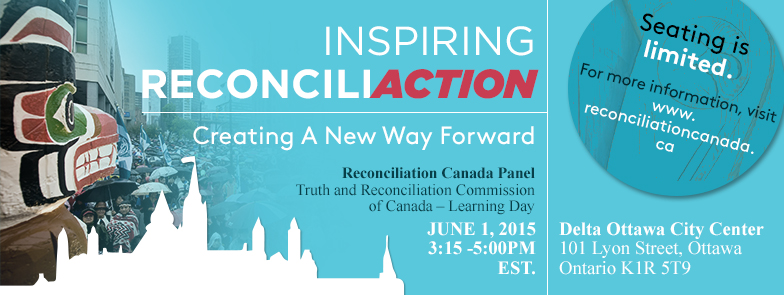 Jul 2, 2015
Jul 2, 2015
The day following the historic Walk for Reconciliation through Downtown Ottawa, community leaders from all walks of life packed the Delta Hotel Ballroom for ‘Inspiring Reconciliaction: Creating a New Way Forward’. This event, a panel discussion that delved into the inter-generational and multi-cultural aspects of reconciliation, invited community leaders from all walks of life to reflect critically on their role in reconciliation.
Moderated by Dr. Philip Oxhorn, Professor of Political Science at McGill University, and Charlotte Hoelke, a PhD candidate in Canadian Studies at Carleton University, the panel opened with a prayer from spiritual advisor, Albert Dumont and then quickly dove into the matter at hand.
Reconciliation Canada Ambassador, Chief Dr. Robert Joseph, was joined by Jessica Bolduc, Project Coordinator of the 4Rs Youth Movement; Bob Watts, former CEO of the Assembly of First Nations; Todd Khozein of Second Muse; and Mary Simon, former president of Inuit Tapiriit Kanatami.
Each panelist spoke on how they saw the state of reconciliation today and their own experiences, before the floor was opened to questions and comments from the audience. The panelists heard from residential school survivors, activists and community leaders, and fielded some thought-provoking questions including a discussion on the role of self-determination in the reconciliation process.
Reconciliation Canada is proud to have had the opportunity to host such an inspiring event. We offer our sincere gratitude to the panelists and moderators who helped deliver such an important discussion, and to our funders and sponsors for their generous support.
Most of all, we would like to thank all those who joined us to listen, learn and engage in discussion. Your participation in this event made it abundantly clear that the closing of the Truth and Reconciliation Commission is not the end; it is just the beginning and that we all have a role to play in reconciliation.




The Walk for Reconciliation was made possible through the generous support of:

We extend our sincere appreciation to our sponsors who made this panel discussion possible.
Platinum Sponsor:

Gold Sponsor:

Bronze Sponsor:


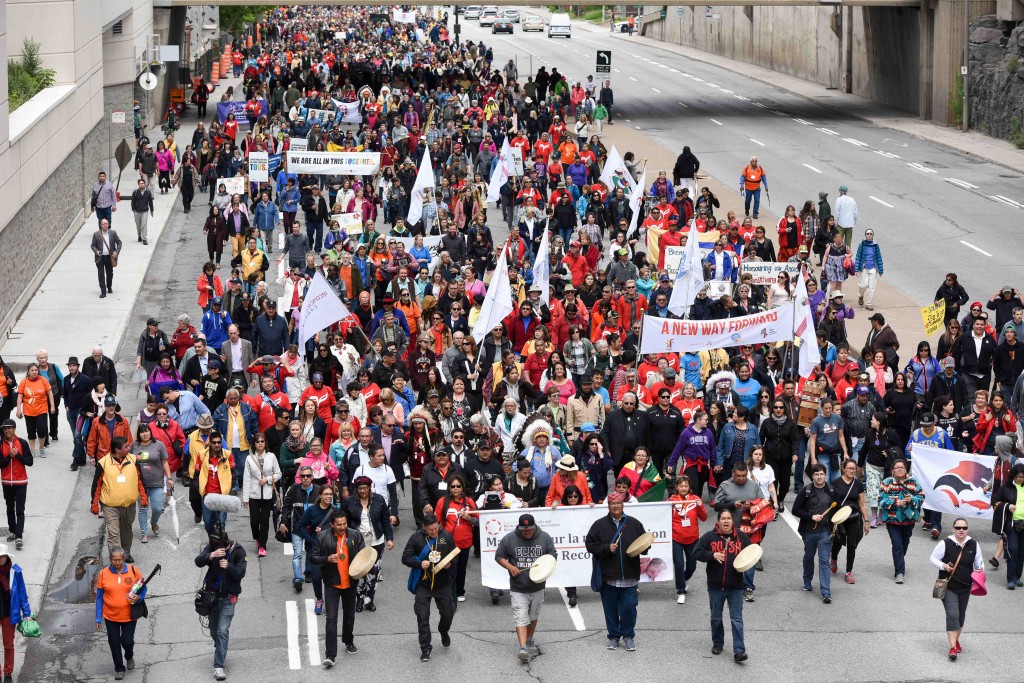 Jun 19, 2015
Jun 19, 2015
It’s a cool, overcast Sunday morning, and thousands have gathered at the École secondaire de l’Île in Gatineau, Quebec to participate in the Walk for Reconciliation.
The final, closing event of the Truth and Reconciliation Commission of Canada has officially begun. The theme of the opening day is “we are all in this together,” an idea perfectly symbolized by this diverse and well-attended gathering.
As anyone who has ever run the Ottawa marathon will tell you, Gatineau is a rippled terrain of hills. Just north of the Ottawa River, it was once the border where Lower and Upper Canada met. Jaques Cartier Park, the Macdonald–Cartier Bridge, and numerous other nearby landmarks recall the figures of Canada’s early history. From the northern shore of the river, where the Metis architect Douglas Cardinal’s Museum of Civilization sits, you can gaze upward to the commanding presence of Parliament Hill. In this part of the country, History is inscribed into how long does proviron take to work every brick, bench, and boulevard.
“It was absolutely exhilarating,” says Chief Dr. Robert Joseph of the day. The final report of the Truth and Reconciliation Commission, he notes, has been six years in the making. Many years before there even was a TRC, survivors were working toward this day. It’s been almost twenty-five years, for example, since Phil Fontaine told his story to a reporter from the Globe and Mail. Roughly twenty-five years since the Royal Commission on Indigenous Peoples released its final report. At that time, Chief Joseph was involved in the dialogues which would give rise to Canada’s Alternative Dispute Resolution process—the precusors to the Indian Residential School Settlement Agreement.
At the end of the Walk for Reconciliation, in the plaza of Ottawa City Hill, Chief Joseph is looking forward. He has been looking forward for decades now, dreaming of the day when survivors stories have been heard across Canada. It was “so moving to be there,” he says. “So powerful and compelling. The TRC report has laid bare the truth of the residential schools and legitimized the truth that we’ve all been taking about.”
The media are all here. So are Canadians from all walks of life. The mood of the participants is positive and hopeful. Chief Joseph gives a speech which concludes by saying that reconciliation “begins with you—so the call goes out to you this day to join in the journey of reconciliation.” His brief but powerful speech is followed by music and dancing. Inside Ottawa’s city hall, the residential school Witness Blanket has been installed. People gather around it, sharing their stories.
The first Walk for Reconciliation took place in Vancouver in September 2013 to coincide with the TRC British Columbia National Event. It’s purpose was to transform and renew the very essence of relationships among Indigenous peoples and all Canadians—to find a new way forward in our relationships with each other. Following the success of this walk, co-hosted by Reconciliation Canada and the Truth and Reconciliation Commission of Canada, discussions were undertaken with the TRC Commissioners to have a similar event in Ottawa. Everyone agreed that this was a great idea.
Reconciliation Canada is honoured to have had this opportunity. We express our gratitude to the many people of goodwill who participated, and who also joined survivors in gestures of solidarity all across Canada. The walk was a simple but profound expression of caring for one another. “I was just really moved,” reflected Chief Joseph. “All of this work has culminated in something that will allow us to redefine this country, hopefully with other Canadians.”
A sincere heartfelt Thank-you to everyone who participated! We at Reconciliation Canada acknowledge and honour the courage and resilience of survivors whose unwavering commitment to truth, healing and reconciliation made the work of the Truth and Reconciliation Commission possible.
Reconciliation will mean many things to many people. It will be big. It will be small. It will be simple. It will be complex. But remember this—that it all begins with you.
The Walk for Reconciliation was made possible through the generous support of:

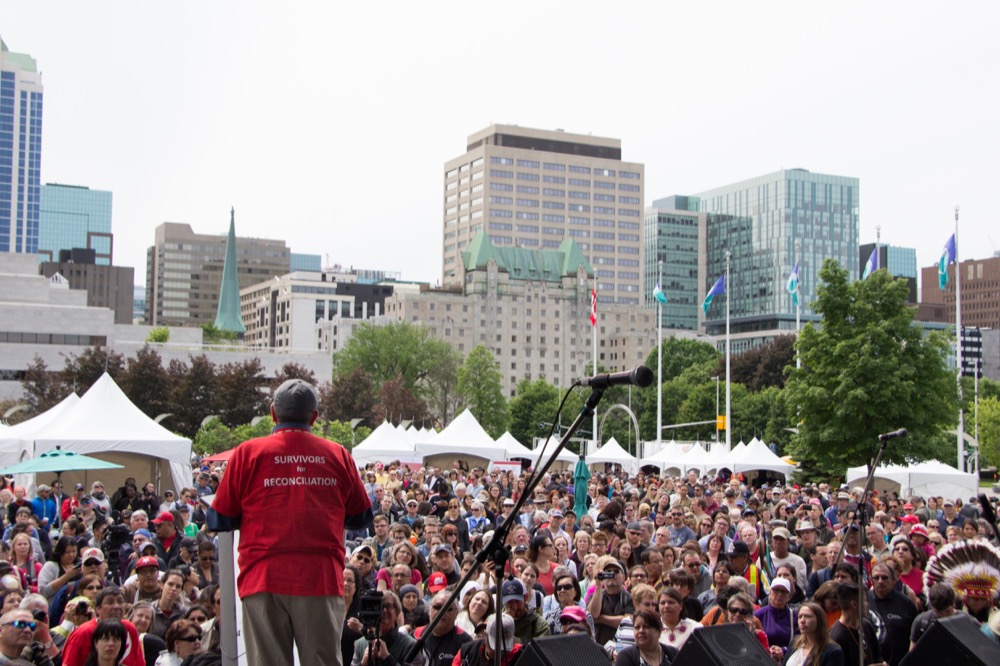 Jun 18, 2015
Jun 18, 2015
The TRC’s Findings and Recommendations confront the disparity between typical Canadian historical perspectives and Aboriginal reality, bringing light to the Aboriginal truth in Canada – a truth of harm experienced for generations in the Indian residential school system.
Canada owes the TRC commissioners a huge debt of gratitude. The Findings and Recommendations create an opportunity for real change for all Canadians. It provides the potential to educate and provide context for dialogue among governments, private institutions and citizens alike. Moreover, the Findings and Recommendations provide a strong foundation upon which any organization can move forward on reconciliation.
For Reconciliation Canada, the TRC Findings and Recommendations highlight the importance of continuing the work we began three years ago. Our initiatives support the TRC Recommendations in many areas, including education, training and public awareness. Reconciliation is a long journey and there is much work to do.
Through partnership building and working with community organizations, faith-based groups, businesses and governments, we will continue to create a safe space for Aboriginal peoples and all Canadians to engage in meaningful dialogue.
Together, we are charting a New Way Forward.
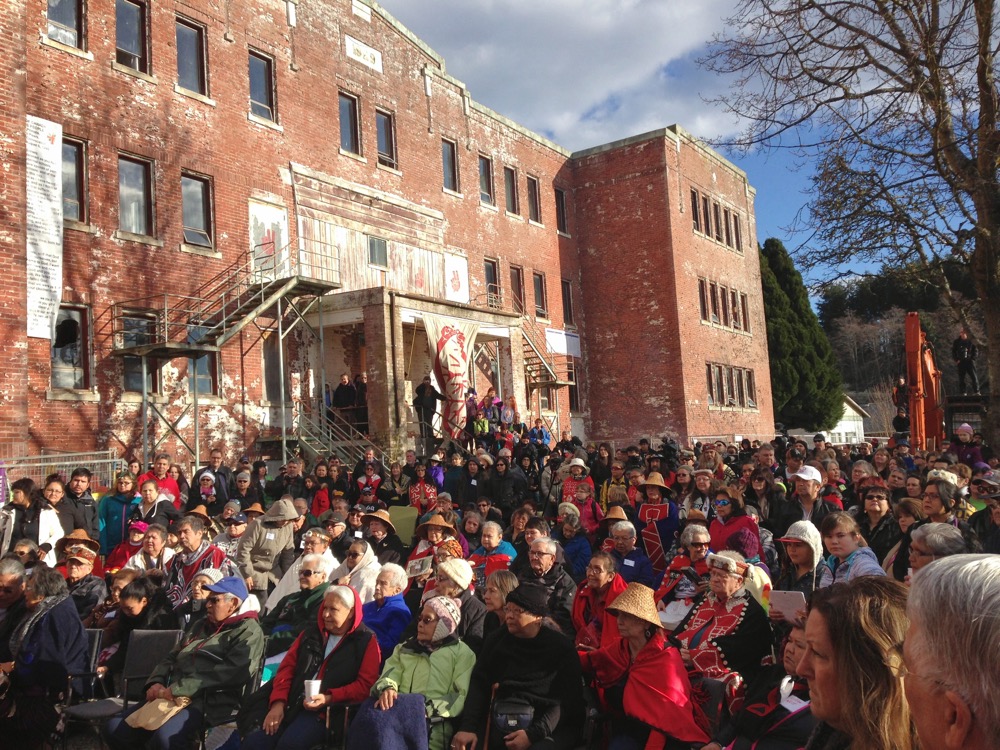 Feb 19, 2015
Feb 19, 2015
In a powerfully moving and emotional ceremony yesterday, hundreds of residential school survivors and their family members gathered with political leaders, First Nations leaders and Anglican Church representatives to witness the commencement of the demolition of St. Michael’s Indian Residential School at the residential school site in Alert Bay, British Columbia.
More than 500 people crowded onto the former school grounds for an all-day event called l’tustolagalis in Kwak’wala, translated as “Rising Up, Together”. School survivors gave poignant recollections of the trauma experienced by children—and their children’s children—over the years. ‘Namgis First Nation Chief Debra Hanuse stated that while demolishing the building does not erase the truth of what has happened, it provides an opportunity for survivors to release their grief and pain. Participants lit a sacred flame and observed a moment of silence for the children who never returned back to their homelands.
St. Michael’s survivor and Reconciliation Canada Ambassador Chief Dr. Robert Joseph attended the event along with representatives including Assembly of First Nations National Chief Perry Bellegarde, Union of BC Indian Chiefs Vice President Chief Bob Chamberlin, BC Assembly of First Nations Regional Chief Jody Wilson-Raybould, Regional Director General, BC Region, Aboriginal Affairs and Northern Development Canada Eric Magnuson and Bishop Dr. Logan McMenamie from the Anglican Diocese of BC.
“Through ceremony and prayer, together we take steps toward reconciliation,” said National Chief Perry Bellegarde. “Witnessing the Bishop of the Anglican Church pledge to continue reconciliation and change attitudes toward First Nations is encouraging. Witnessing the release by the survivors is powerful. Seeing that some are still hurting tells us that there’s more work to do. And witnessing the young people sing their songs in their language gives us all hope. “
“For many years I would never have believed this day would come,” said Chief Dr. Robert Joseph. “It was hard for many people to be here today but for many of us a weight has been lifted,” Chief Joseph added. “To come together this way—all of us together—is a powerful message of strength, healing, hope and optimism for the future.”
To view the full media advisory, please click here.
For photos, click here.
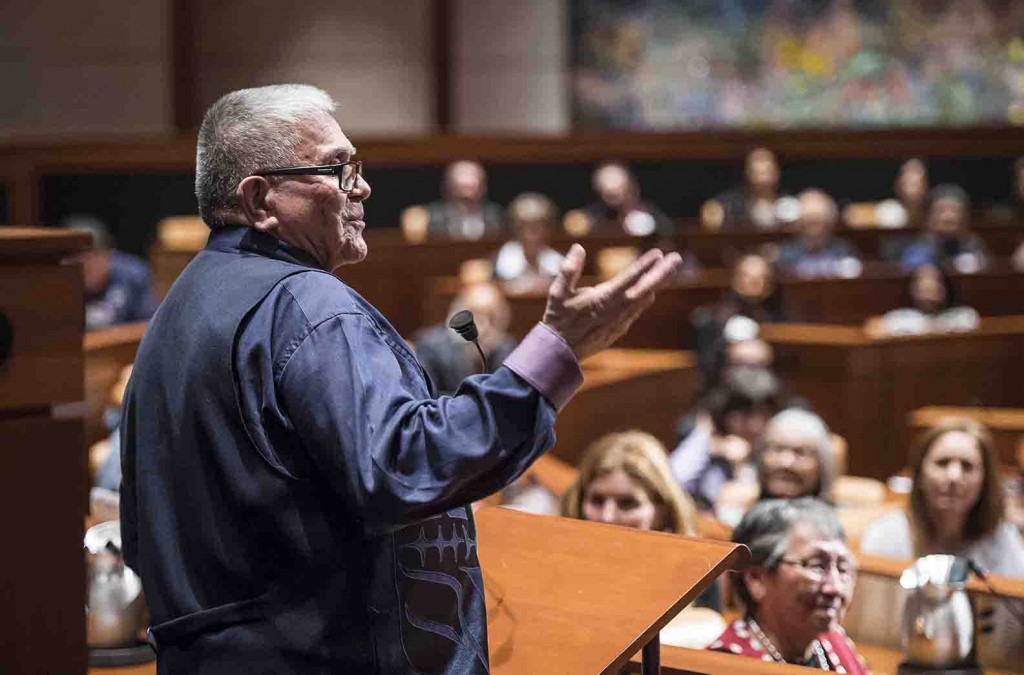 Jan 29, 2015
Jan 29, 2015
 Nov 26, 2014
Nov 26, 2014
On November 6, 2014, Reconciliation Canada partnered with the Justice Institute of British Columbia (JIBC) to host a Reconciliation Dialogue Workshop. The workshop, organized by the JIBC Office of Indigenization, provided an opportunity for staff, faculty, students and Aboriginal partners to engage in dialogue that helps to inspire positive change and encourage participation in a new way forward to create a better, stronger Canada for all.
We are proud to partnered with such an inspirational organization and look forward to future collaborative opportunities with JIBC.
Click here to find out more about the Reconciliation Dialogue Workshop. For more information on the Justice Institute of British Columbia, please click here.
Oct 29, 2014
We are honoured to announce that on October 28, 2014, the City of Vancouver council unanimously passed a motion to support the City of Reconciliation framework.
The framework focusses on building cultural competency, strengthening relations and developing efficient decision-making within the City’s service provision, as well as legit steroids source strengthening ongoing relationships with Vancouver’s host First Nations, the Musqueam, Squamish, Tsleil-Waututh and urban Aboriginal community. The report also recommends that Council direct staff to develop a four-year work plan and report back with progress every two years.
The motion supports strengthening understanding and relationships with First Nations and Aboriginal peoples with the long term vision of an inclusive city that embraces all cultures and facilitates opportunities for communities to thrive in the City of Vancouver.
We are extremely proud of the City of Vancouver for demonstrating a long term commitment to reconciliation and building a new way forward.
You can read the full report here.
Sep 22, 2014
We are delighted to announce that the City of Vancouver is to proclaim the week of September 22, 2014 “Reconciliation Week”, marking one year since 70,000 people braved the heavy rain to join the Walk for Reconciliation. The proclamation demonstrates a continued commitment by the City to build new relationships among Aboriginal peoples and all Canadians, as well as to further support the initiatives of Reconciliation Canada.
Click here to view the full News Release.

Jul 31, 2014
Story submitted by: Joan Sorely
Orange Shirt Day, held on September 30th annually, is a legacy of the St. Joseph Mission residential school commemoration event held in Williams Lake, BC, Canada, in the spring of 2013. It grew out of Phyllis Webstad’s account of having her shiny new orange shirt taken away on her first day of school at the Mission, and it has become an annual discussion on all aspects of residential schools. The date was chosen because it is the time of year in which children were taken from their homes to residential schools, and because it is an opportunity to set the stage for anti-racism and anti-bullying policies for the coming school year. Orange Shirt Day is also an opportunity for First Nations, local governments, schools and communities to come together in the spirit of reconciliation and hope for generations of children to come.
The orange shirt, once associated with a loss of belonging and self-worth, has become a symbol of defiance against bullying and racism, and of our commitment to ensuring that “Every Child Matters” from here on. The movement is growing, with 30,000 hits on the Facebook page during the week of September 30th last year, and people posting pictures of their celebrations across Canada and in the US, as well as parts of Europe. It all started right here in the Cariboo, and as a result, School District 27 has been chosen to pilot curriculum changes for all Grade 5 and Grade 10 students reflecting the residential school experience, to be implemented province-wide.
Resolutions have been passed in support of Orange Shirt Day by local governments, school districts, and First Nations in the Cariboo and beyond. Most recently the AFN Chiefs-in-Council passed a resolution declaring Orange Shirt Day “a first step in reconciliation”, and pledging to bring the message home as well as to the government of Canada and the churches responsible.
Visit us on Facebook: Orange Shirt Day – Every Child Matters. Post pictures of your event or activity, share your story, or simply enjoy others sharing their experiences.


Apr 30, 2014
We are pleased to announce that the J.W. McConnell Family Foundation is supporting Reconciliation Canada in strengthening its program expansion and capacity building. We are extremely grateful for their support and look forward to catalyzing positive change across Canada.

The J.W. McConnell Family Foundation engages Canadians in building a more innovative, inclusive, sustainable, and resilient society. The core purpose of the Foundation is to to improve the quality of life in Canada by building communities that help people develop their potential and contribute to the common good.
« Previous Page —
Next Page »





















